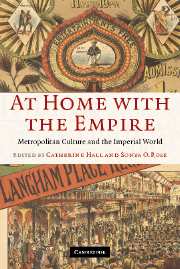Book contents
- Frontmatter
- Contents
- Notes on contributors
- 1 Introduction: being at home with the Empire
- 2 At home with history Macaulay and the History of England
- 3 A homogeneous society? Britain's internal ‘others’, 1800–present
- 4 At home with the Empire: the example of Ireland
- 5 The condition of women, women's writing and the Empire in nineteenth-century Britain
- 6 Sexuality and empire
- 7 Religion and empire at home
- 8 Metropolitan desires and colonial connections: reflections on consumption and empire
- 9 Imagining empire: history, fantasy and literature
- 10 New narratives of imperial politics in the nineteenth century
- 11 Bringing the Empire home: women activists in imperial Britain, 1790s–1930s
- 12 Taking class notes on empire
- 13 Citizenship and empire, 1867–1928
- Select bibliography
- Index
12 - Taking class notes on empire
Published online by Cambridge University Press: 11 April 2011
- Frontmatter
- Contents
- Notes on contributors
- 1 Introduction: being at home with the Empire
- 2 At home with history Macaulay and the History of England
- 3 A homogeneous society? Britain's internal ‘others’, 1800–present
- 4 At home with the Empire: the example of Ireland
- 5 The condition of women, women's writing and the Empire in nineteenth-century Britain
- 6 Sexuality and empire
- 7 Religion and empire at home
- 8 Metropolitan desires and colonial connections: reflections on consumption and empire
- 9 Imagining empire: history, fantasy and literature
- 10 New narratives of imperial politics in the nineteenth century
- 11 Bringing the Empire home: women activists in imperial Britain, 1790s–1930s
- 12 Taking class notes on empire
- 13 Citizenship and empire, 1867–1928
- Select bibliography
- Index
Summary
The impact of empire on British class formation and identities was uneven, varying across different social groups and at different historical moments. Unfortunately, the scholarship on the relationship between class and empire is itself fragmented and sometimes inadequate for answering some of the most pressing questions. In part, this has to do with the disciplinary division between domestic history, including ‘history from below’, and imperial history in its more traditional guise; a separation which a new generation of scholars has challenged, although class has not been high on the agenda of the new imperial history. Moreover, as a category of historical understanding, class has been under fire for some time. And yet like an earlier generation of Marxist historians against whom they have set their sights, scholars most intent on undermining class's status as a master category of British history have themselves left the division between domestic and imperial history largely undisturbed, reconfirming (at least implicitly) the assumption that empire had little impact on metropolitan society and political culture. Nonetheless, in revisiting class from the perspective of empire, we should acknowledge the artificiality of pulling class out of a matrix of hierarchically ordered identities – gender, ethnicity, nation, race, etc. – that impinged on people's lives. We must also take care not to treat empire as a unitary object or static formation; different sties of empire were subject to different forms of rule and thus differing connotations for class identities.
- Type
- Chapter
- Information
- At Home with the EmpireMetropolitan Culture and the Imperial World, pp. 251 - 274Publisher: Cambridge University PressPrint publication year: 2006
- 3
- Cited by



